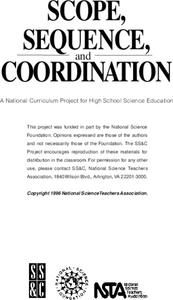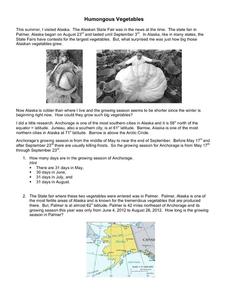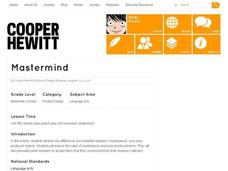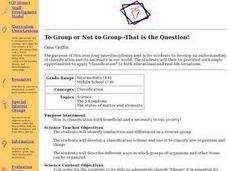Inside Mathematics
Winning Spinners
Winning a spin game is random chance, right? Pupils create a table to determine the sample space of spinning two spinners. Individuals determine the probability of winning a game and then modify the spinners to increase the probability...
Inside Mathematics
Marble Game
Pupils determine the theoretical probability of winning a game of marbles. Individuals compare the theoretical probability to experimental probability for the same game. They continue on to compare two different probability games.
Curated OER
The Paragraph
Review the components of a well-written paragraph with your class. Be sure your writers include a topic sentence supported with main ideas and followed by a conclusion. Unity, coherence, and transition words are emphasized. Experiment...
Noyce Foundation
Parallelogram
Parallelograms are pairs of triangles all the way around. Pupils measure to determine the area and perimeter of a parallelogram. They then find the area of the tirangles formed by drawing a diagonal of the parallelogram and compare their...
Inside Mathematics
Rhombuses
Just what does it take to show two rhombuses are similar? The assessment task asks pupils to develop an argument to show that given quadrilaterals are rhombuses. Class members also use their knowledge of similar triangles to show two...
Curated OER
What's in Front?
Front and back are common prepositions. Early readers will practice understanding relative positions while using common prepositions by placing a check next to objects in front. Then they draw a cat in front of the house. Tip: Discuss...
Curated OER
Classification Schemes
Junior biologists journey through the hiearchy of living things with these activites. Using a dichotomous key, they identify common algae, plants, and fish. They design their own key for a mixture of seeds and a collection of...
Curated OER
Deck the Halls with Literature Trees
Reinforce and assess reading comprehension by having your class make a literature tree! After reading a book, pupils make decorations to represent the book's themes, characters, and setting. Materials for decorating can be as diverse and...
Curated OER
Plagiarism
Don't get caught plagiarizing! Before starting your research unit, use this lesson to help your young writers identify plagiarism. The truth is, many kids don't even realize when they're doing it! They practice citing sources when...
Curated OER
Humongous Vegetables
Humongous vegetables can inspire and awaken your mathematicians to the large math concepts in our Common Core standards. What is the secret to growing such gargantuan garden objects in Alaska? In the state that is closest to the...
Scholastic
Frindle Lesson Plan
"Who says a pen has to be called a pen? Why not call it a frindle?" Inspired by this quote from the award-winning novel written by Andrew Celements, this lesson allows children to invent their own...
Curated OER
Beside
It's important for youngsters to understand common prepositions; use this drawing worksheet to give them some practice. They follow directions which, for pre-readers, will need to be read to them. There are four prompts here directing...
Baylor College
Need or Want?
Even as adults it can be hard to distinguish needs from wants. Using pictures of common, everyday items, children make a pocket chart separating the objects they need from those that they want. Discuss their choices, explaining that...
Illustrative Mathematics
Shape Hunt Part 2
Shapes are everywhere in the world around us, from rectangular doors to the circular wheels of a car. The second lesson plan in this series opens the eyes of young mathematicians to this wonderful world of shapes as they search the...
Laboratory for Atmospheric and Space Physics
Goldilocks and the Three Planets
Venus is the second brightest object in the night sky after the moon. Here is an interesting lesson that explores three planets — Venus, Earth, and Mars — specifically their surfaces and atmospheres. Through an analysis of their spectra,...
Los Angeles County Office of Education
Assessment for the California Mathematics Standards Grade 7
In need of an all-inclusive seventh grade math resource? Packed full of the topics necessary for Pre-Algebra the packet includes practice problems with different difficulty levels. It works great for any supplemental use needed...
Curated OER
Do You See What I See?
Young scholars engage in a lesson that differentiates between right and wrong types of observations. In order to conduct the experiment they are provided with leaves and nameless objects with different designs. The two are compared and...
Curated OER
Perception and Observation
Students use common and unusual objects to make observations of details, design, and functionality. They describe and draw each object while working in small groups. The differences between observation and perception is covered as part...
English Enhanced Scope and Sequence
Blending and Segmenting Multisyllabic
Syl lab i ca tion. Kindergartners practice segmenting and blending multisyllabic words in an activity that asks them to repeat the process modeled by their teacher. The teacher slowly says the name of a classroom object, enunciating each...
Curated OER
Labeling Forces Correctly!
Define six common forces: propulsion, air resistance, water resistance, friction, gravity, and upthrust. A picture of a Smart Car is displayed with arrows showing all of the forces acting on it when it is motion. A picture of a rubber...
Curated OER
Magnet Magic
Magnets are a source of amazement for young learners. It seems like magic the way they can attract certain things. This activity gives some background on which materials can be attracted to a magnet. Then, learners must circle the words...
Curated OER
Mastermind
Students observe the differences and similarities between "masterpieces" and mass-produced objects. They analyze the value of masterpieces and mass-produced items. Students persuade panel members to accept items that they recommend into...
Curated OER
To Group of Not to Group - That is the Question!
Upper elementary and middle schoolers use their observation skills to group different kinds of candy by similar characteristics. They debate whether or not we should classify objects. Finally, they learn that biologists have developed a...
Curated OER
An Easier Way to Count: Using Groups of 10
Students explore their counting skills. For this counting lesson, students group objects in sets of 10 to practice counting them. Students also practice graphing the sets of objects they count. This lesson incorporates...























